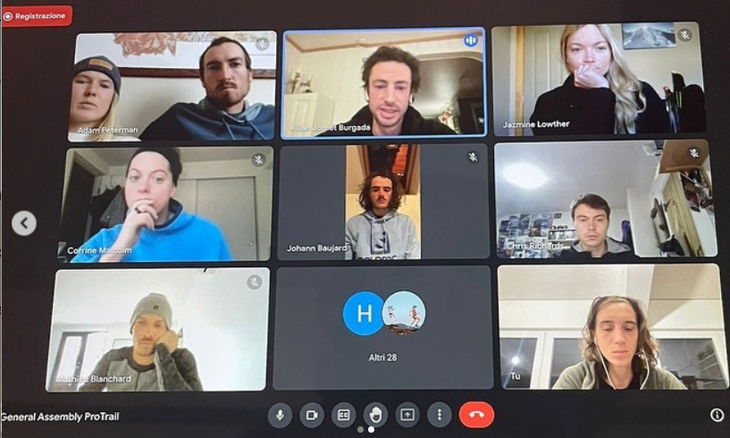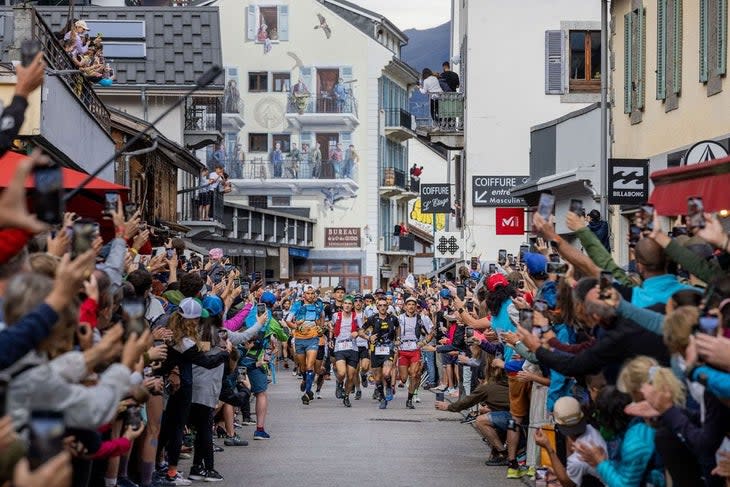The Pro Trail Runners Association: Trail Running’s First Union
This article originally appeared on Trail Runner
If you've been following the expansion of trail running over the past few years, you've noticed the rapid growth of our sport has been accompanied by numerous growing pains. While the growth of our sport has seen thousands of road runners take to the trails, the continued professionalization of athletes, new sponsors, and many new course records, it has also brought new challenges. For every runner, whether amateur or professional, issues of media equity, SafeSport, doping, athlete rights, and race organization are poignant questions when evaluating the future of the sport.
"Our sport is growing super fast, and when you grow super fast there will be issues," said Albert Jorquera, the new Pro Trail Runners Association's General Secretary. "It's like a city, if you make buildings too quickly and don't stop to think about how the city is organized you may end up making a city that is super ugly."
In 2022, we began to see some stark examples of growing pains throughout our sport:
2022 saw the massive expansion of the UTMB race series. Backed by the Ironman Group, UTMB made a cohesive and obvious effort to control the race calendar, building a system that incentivizes--some would say, forces--athletes to only race in UTMB series races. In order to compete at the UTMB finals in Chamonix, athletes must compete in a UTMB World Series event, whereas previously, elites could bank on a high ITRA score for automatic entry.
The year also saw the sport's first big doping busts at Sierre Zinal; both winners of the historic race were disqualified after testing positive for prohibited substances. Those incidents sent shock waves through the sport and left many to question the effectiveness of the anti-doping regulations.
The question of equity was also heavily prevalent. From discussion on gender balance at races like the Hardrock 100 to the controversy surrounding UTMB's bias policy on media, the conversation of equity was at the forefront of runners' minds.
RELATED: Trail Running and Drug Testing: Where Do We Go From Here?

A Collective Voice
For many fans, professional runners, and event organizers, these moments seemingly threaten the future of the sport. While these issues have been brewing for years, they came to the forefront in 2022.
"People who care about and know the sport all share similar views in terms of accessibility, anti-doping, professionalization, environmental impact and so on. But there’s a gap between these issues and the reality of the decisions that affect the current status quo," explained founding member Francesco Puppi.
Although many athletes share concerns about representation, anti-doping, and race schedules, the lack of a cohesive organizing body has always hampered the ability to collectively voice concerns. Organizing an athlete association, or union, would would require risk, leadership, and structure. "I think a collective voice in this day and age is super important when people can be canceled for saying the wrong thing," explained Hillary Allen, professional trail athlete and PTRA member. "Just look at Martina Valmossoi trying to press UTMB on social media to be paid fair prize money for TDS. Without a collective voice, we don't have the weight to make a difference."
And yet, without complete buy-in from athletes across the trail running disciplines, an association would fail to hold any power or weight.
The first attempt at starting an athlete association began in early 2020. A small group of athletes, led by Kilian Jornet, four-time UTMB winner, Francesco Puppi, an established Italian skyrunner, and Pascal Egli, 2018 skyrunning world champion--all three, highly respected European athletes--began to discuss what a trail running union could look like. Yet, as with most things, collective agreement does not equal collective action, and the conversation stirred excitement among athletes but fell short of forming a legitimate entity.
Two years later, the doping scandal that developed after Mark Kangogo's victory at Sierre Zinal set off alarm bells across the sport. For Jornet, the scandal was a wake-up call and gave him renewed motivation to restart the conversation around a trail runner association. "Kilian called me immediately after the race to see if I would want to revisit the conversation of starting an association for the sport," Francesco Puppi recalls. Before rallying other athletes around the mission, Jornet, Puppi, and Egli began work throughout the fall to form the structure of the organization. On November 13th, 2022 they officially founded the Pro Trail Runners Association (PTRA), a non-profit entity based in Switzerland.
The second key step was to ensure that the broader professional athlete community was ready to commit to such an organization. On November 18th, Jornet sent an email to the top 150 athletes in the sport, as identified by their ITRA scores, inviting them to join the newly formed Pro Trail Runner's Association (PTRA). The email outlined the pertinent issues the athlete community needed to address: the increase in doping cases, climate change, preservation of the values and ethos of the sport, and the overall representation and collective bargaining power of athletes. The email concluded:
"That's why we have created the Pro Trail Runners Association, where professional athletes can have a voice at the same level as the other parties (federations, circuits, sponsors...) and we can work to make the sport more fair, equitable and to protect our rights as athletes."
More than 120 athletes from 35 different countries joined as members, marking the official formation of the first-ever trail running association. Of the initial members, most of the biggest names in our sport committed to the association, including Jim Walmsley, Courtney Dauwalter, Corrine Malcolm, Tim Tollefsen, Ruth Croft, Francois D'Haene, and dozens of other household trail names. While the initial invite was sent out to 150 individual athletes, the association is open to any trail runner under a sponsorship contract or ranked in the top 30 rankings by ITRA, UTMB, WMRA, or GTWS--in other words, any professional trail athlete.
RELATED: Will This Be The Last Great UTMB?

The First Meeting
On December 15th, 2022 the first general assembly of the PTRA was held virtually.
As the news of the first PTRA assembly spread, one key quote emerged from the initial general assembly meeting: "We're not planning to strike, but now we can if we need to." Jornet explained that, while there were no immediate plans to strike, the PTRA marked the first time a strong-enough coalition was built for a strike to be possible and effective. It was a bold statement and one that turned a lot of heads, foreshadowing the potential weight and power of the organization.
"We want the voice of the athletes to hold the same weight and value as the other players in the sport," Puppi said. "The power to strike is our ultimate weapon, one that we hope will never have to use." For years, athletes have held little to no power in the sport, fearful that voicing concerns to sponsors, races, or organizational bodies could lead to backlash and endangering their careers. Now, a concern voiced by PTRA would hold the weight of every professional athlete, immediately giving them a powerful seat at the table of every major discussion.
PTRA's Structure
In the initial PTRA meeting, the organization voted on establishing seven board members, each to a two-year term. The inaugural board includes Puppi, Egli, Malcolm, Kaytlyn Gerbin, Pau Capell, Frederic Tranchand, and Eszter Csillag. Additionally, the general assembly voted on four key issue areas that the organization will focus on--athlete rights, anti-doping, competitions, and environment. Each board member will help oversee the working groups, interacting with the general members of the association to form action points on key issues of the PTRA.
PTRA will primarily focus on each of these four key issue areas. Working with WADA, USADA, and Quartz, PTRA will help establish better anti-doping protocols across the sport, ensuring its safe and fair future. "Quartz (the current anti-doping entity overseeing much of trail running) has ignored international anti-doping policies, and created their own, often discriminatory practices" stated Corrine Malcom a board member for PTRA in an interview, "We (PTRA) need to be thinking about anti-doping policies that best for our sport 10-15 years down the road not just what's best for next year."
The association will also focus on athlete rights within the sport, creating educational materials for the athlete community and advocating for the rights of all athletes. The third focus for PTRA will be to help mitigate the environmental impacts of trail running, discussing future protocols and standards for events to ensure a minimal carbon footprint. Lastly, the association will work with race organizers to help plan a smart, athlete-friendly race calendar, ensuring the sport has the appropriate race structure for future success.
In addition to the board members, the organization hired Spanish trail runner Albert Jorquera--its only paid member and only non-elite athlete member--to function as the General Secretary for the organization. His role will be to lead all external conversations for PTRA, functioning as the voice of the organization. Jorquera, a long-time journalist in the sport and three-time UTMB finisher, is well-acquainted with the issues, organizations, and politics of trail running.
"We clearly need someone who is speaking on behalf of these values, and obviously the athletes know these values best," explained Jorquera. "But if they don't have a clear voice and unity then no one will be able to hear them. In the past there were just one or two athletes complaining, and that never did much good...We need someone who has courage enough or is strong enough to stand up and I think that is now the role of the association."
RELATED: More Prize Money Is Flowing Into Trail Running. What Does That Mean for the Sport?

What will the PTRA's Impact be?
Developing an organized group is a great first step, but the word "union" can be a double-edged sword. What will it mean for the future of the sport? Corrine Malcom, a professional trail runner and newly appointed board member of the PTRA, explained the association's vision and gave perspective to Kilian's initial statement. "The goal is not to strike, but to have a way to communicate as a cohesive entity with one voice," Malcolm said. "We need to be thinking about what’s best for our sport 10-15 years down the road, not just what’s best for next year."
Time will tell what impact the association will have on the sport's development and professionalization, but, for the time being, it's a start. "While the association is dedicated to elite athletes, I would like to think that the impacts will be felt by every athlete in the sport," Puppi said. "We hope to make the sport better for everyone, not just the elites."
It will be interesting to see what sway and impact the association will have and where the industry will first see the weight and collective voice of the PTRA. Yet, Jorquera summarized the situation well: "In the end we all want the sport to grow, but to grow healthy. We all want to preserve the culture and ethos of the sport, the question is: who will preserve it if we don't?”
For exclusive access to all of our fitness, gear, adventure, and travel stories, plus discounts on trips, events, and gear, sign up for Outside+ today.

